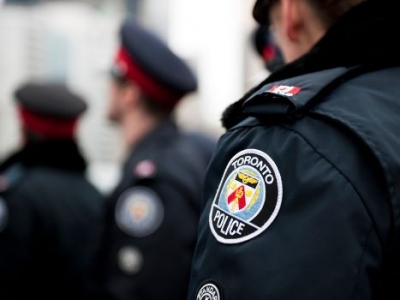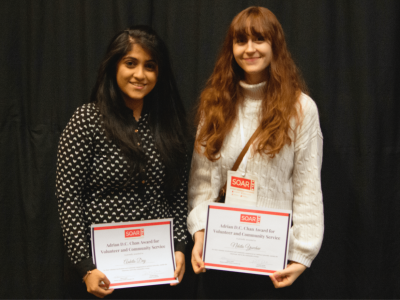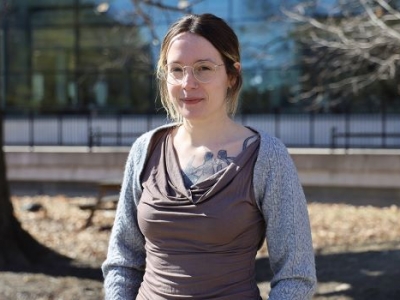Recently, 19 students (grad and undergrad) travelled to Israel as part of their coursework. The four graduate students are all registered in the 5850 Religion and Public Life in Israel and received funding assistance from the Faculty of Graduate and Postdoctoral Affairs. Two of the graduate students agreed to share their impressions of the trip.
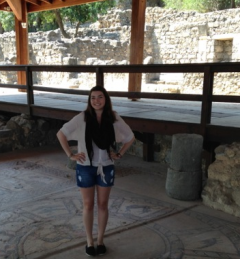 First Dana Murray:
First Dana Murray:
Our course truly enriched my own studies in the MA in Religion and Public Life program, bringing concepts together that we have spent several months studying, such as secularism, nationhood, and identity. As students of this course, we were fortunate enough to enjoy guest lectures by individuals such as Benny Porat of Hebrew University Law School and Prof. Marc Brettler of Brandeis University, amongst others. From these lectures, as well as visits to the Knesset, and even the streets of Jerusalem, we were able to see religion and public life come together in a unique manner.
I must say that in a way I believe this course meant even more to me, as we were able to visit multiple archaeological sites that I have encountered in my own research on Judean identity and the ancient synagogue. Nothing can compare to witnessing your research first hand, or learning from a local archaeologist such as our tour guide, Danny Herman, or Gabriel Barkay, Director of the Temple Mount Sifting Project.
But it wasn’t all lectures or museums; we were able to enjoy the lighter side of things that Israel has to offer. I think everyone was a fan of Genesis Land where we were able to ride camels and enjoy a deliciously memorable lunch overlooking the Judean desert while a very charismatic Abraham (who sounded suspiciously Australian) told us about his journey to the land and his family. I truly believe that this course was a once in a lifetime opportunity and I am very grateful to have been a part of it.
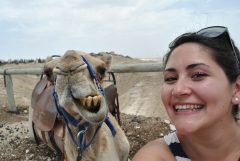 Christina Pasqua had this to say about her travels.
Christina Pasqua had this to say about her travels.
When I decided to study in Israel this spring, I made a point of not setting any expectations about what I would see and experience with regard to “religion and public life.” This was largely influenced by an event I attended in February, where I was introduced to Eitan Weiss, the First Secretary of the Israeli Embassy, who offered a piece of advice that has proven to be significant to my travels. To paraphrase, he said: put your biases and preconceptions aside, along with whatever you have heard in the news, in order to truly experience Israel for yourself. As a masters student who has been trained to think critically about everything, I thought this would be a difficult request to uphold, but now that I have traveled the country, I understand why Weiss’s statement continues to resonate.
The reality is that the array of cultural, political, and religious issues in Israel are far too complex to truly grasp in a short three-week trip. I was reminded of this each day of my tour, whether I was visiting an archeological site, the Knesset (i.e. the Israeli Parliament), an orthodox synagogue, the Western Wall, the Christian quarter of the Old City, or woken up before dawn by the call to prayer—which I could hear from my dorm room at Hebrew University. These examples highlight how Israel, as a Jewish state that is also home to religious diversity, must accommodate citizens and foreigners alike (i.e. tourists and pilgrims) who identify with the land on either religious or secular grounds. More importantly, these examples communicate a sense of identity that is closely tied to sacred space and memory, which functions as a source of commonality among Christians, Muslims, and Jews, especially in Jerusalem.
This dynamic is seen through art, public holidays (e.g. Israel’s Independence Day or Shabbat), Holocaust memorials, sacred structures, food laws, and various forms of dress. These aspects of Israeli life are not only visible to the outsider, but also deeply embedded in the country’s identity and that of its people. From my perspective, part of understanding the representation of religion and public life in Israel is about subjecting oneself to the insider experience, to observe and participate in it while maintaining a critical, outsider perspective. Therefore, striking a balance between what you think you knew before you got there and what you eventually learn by becoming part of a lived experience that is historically situated and culturally conditioned.
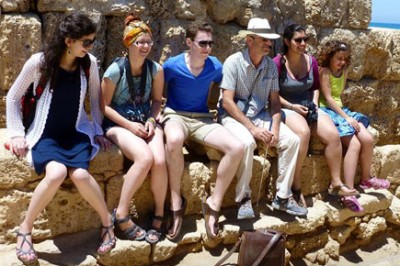
Monday, June 2, 2014 in Grad Student blogs, News, Programs
Share: Twitter, Facebook


